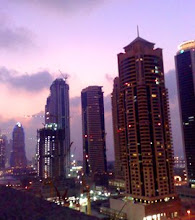 Dubai airport is now the world’s 6th busiest. According to government data, the total population of the emirate in 2007 was more than 1.5 million, and it is expected to grow at a rate of around 7 percent. Out of these, only around 17 percent are Emiratis.
Dubai airport is now the world’s 6th busiest. According to government data, the total population of the emirate in 2007 was more than 1.5 million, and it is expected to grow at a rate of around 7 percent. Out of these, only around 17 percent are Emiratis. As so many expats settle in the city, and number of business and tourist arrivals continues to rise, is Dubai now trying to assert its cultural status? Internet provider Du recently banned sites which were deemed as “inconsistent with the moral, cultural and social values of the UAE”; Mall of the Emirates now has posters advising shoppers not to “show excessive amounts of flesh” and “should refrain from public displays of affection, like kissing.” Burjuman and Reef Malls plan to follow suit.
Why this sudden tightening? The government must be convinced these new rules won’t put off migrants and tourists (no porn online, and no bikinis in the mall is not such a bad thing), but it does suggest Dubai wants to draw a line on what is acceptable, and what isn’t. It also coincides with louder calls for more jobs for locals. The current rate of unemployment for the UAE nationals is 13 percent.
As the UAE celebrates National Identity Year, the concern is where does this assertion end?
The real estate boom requires a huge number of new arrivals to fill apartments and villas. In 2007, around 2,200 structures were built in Dubai at a cost of $4,000 million, out of which around 1,500 were residential. Besides occupants, these buildings also require builders. It is to be assumed neither the occupants nor the builders will be Emirati. And with bigger and costlier projects being signed almost everyday, it doesn’t seem like real estate is going anywhere but up.
Dubai now seems to be sending out mixed signals. On the one hand, it promises to be the dazzling, global cosmopolitan haven, and on the other, a morally and culturally strong Muslim state. It requires a fine balance.




No comments:
Post a Comment